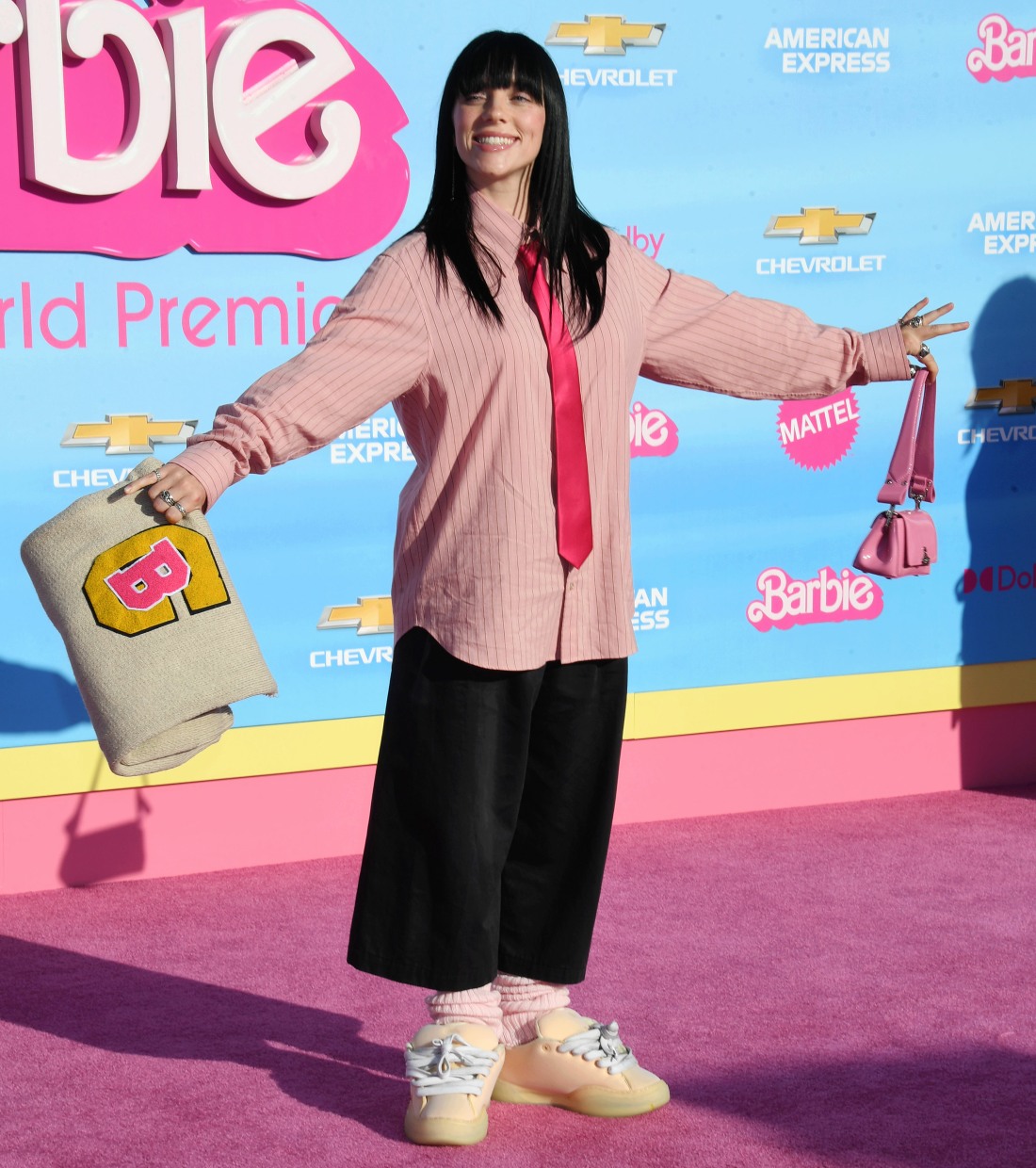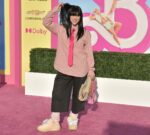Billie Eilish covers the latest issue of Variety. Part of it is advanced promotion for her next studio album, which she’s still finishing as of this interview. Part of it is, I think, a low-key Oscar campaign move. Billie did a song for Barbie – “What Was I Made For,” and the studio might want to submit it for “Best Song” at the Oscars. It’s weird because most people came out of that movie humming “I’m Just Ken,” as performed by Ryan Gosling. Still, Billie is already an Oscar-winner, so maybe she gets priority. Her Variety interview is pretty good – Billie’s interviews can tend towards “navel-gazing” but she’s growing up and developing some good ideas, and she does love to sh-t talk. Some highlights:
Womanity: “Being a woman is just such a war, forever. Especially being a young woman in the public eye. It’s really unfair. It turns out that I’m young, and I have a whole life of s–t I can do. Maybe because my life became so adult very young, I forgot that I was still that young. I settled in a lot of ways: I lived my life as if I were in my 70s. I realized recently that I don’t need to do that.”
Getting out of her comfort zone, taking acting roles: “My life is feeling good. I feel like I’m becoming a person I really love and doing things I feel really proud of. In many ways in my life, I feel like I’m just now waking up.”She hasn’t always been a girl’s girl: In fact, she’s spent much of her life plagued by the assumption that other women don’t like her. “I’ve never really felt like I could relate to girls very well. I love them so much. I love them as people. I’m attracted to them as people. I’m attracted to them for real. I have deep connections with women in my life, the friends in my life, the family in my life. I’m physically attracted to them. But I’m also so intimidated by them and their beauty and their presence.”
TikTokers making their own videos for “What Was I Made For”: “It was so moving, dude. It was so, so touching. I feel like I helped bring people together, and it felt so special. I wasn’t expecting to have women around the world feel connected.”
On being sexualized when she was so young: “I wasn’t trying to have people not sexualize me. But I didn’t want people to have access to my body, even visually. I wasn’t strong enough and secure enough to show it. If I had shown it at that time, I would have been completely devastated if people had said anything. Maybe my not really caring about being sexualized is because I’ve never felt desired or desirable. I’ve never felt like a woman, to be honest with you. I’ve never felt desirable. I’ve never felt feminine. I have to convince myself that I’m, like, a pretty girl. I identify as ‘she/her’ and things like that, but I’ve never really felt like a girl.”
On her bust: “I have big boobs. I’ve had big boobs since I was nine years old, and that’s just the way I am. That’s how I look…You wear something that’s at all revealing, and everyone’s like, ‘Oh, but you didn’t want people to sexualize you?’ You can suck my ass! I’m literally a being that is sexual sometimes. F–k you! Nobody ever says a thing about men’s bodies. If you’re muscular, cool. If you’re not, cool. If you’re rail thin, cool. If you have a dad bod, cool. If you’re pudgy, love it! Everybody’s happy with it. You know why? Because girls are nice. They don’t give a f–k because we see people for who they are!”
As someone who developed early, I’ve always understood Billie’s love-hate-apathy towards her curves. Like, when you have D-cups as a teenager, it f–ks up your self-image and you’re always on guard about what you wear and how men and boys look at you. When Billie went through that years-long phase of wearing really oversized clothes, I got that. I understood that she was mostly uncomfortable with her body and people’s reactions to it. Her comments about not being a girl’s girl are interesting too – my theory is that relates to how she was homeschooled, and she probably didn’t have many (if any) strong female friendships growing up.
Photos courtesy of Avalon Red, IG courtesy of Variety.
- Billie Eilish bei der Weltpremiere des Kinofilms Barbie im Shrine Auditorium. Los Angeles, 09.07.2023 *** Billie Eilish at the world premiere of the motion picture Barbie at the Shrine Auditorium Los Angeles, 09 07 2023 Foto:xD.,Image: 788305607, License: Rights-managed, Restrictions: imago is entitled to issue a simple usage license at the time of provision. Personality and trademark rights as well as copyright laws regarding art-works shown must be observed. Commercial use at your own risk., Model Release: no, Credit line: IMAGO/Dave Starbuck / Avalon
- LOS ANGELES, CALIFORNIA – JULY 09: Billie Eilish attends the World Premiere of “Barbie” at the Shrine Auditorium and Expo Hall on July 09, 2023 in Los Angeles, California.,Image: 788310823, License: Rights-managed, Restrictions: , Model Release: no, Pictured: Billie Eilish, Credit line: Jeffrey Mayer / Avalon
- LOS ANGELES, CALIFORNIA – JULY 09: Billie Eilish attends the World Premiere of “Barbie” at the Shrine Auditorium and Expo Hall on July 09, 2023 in Los Angeles, California.,Image: 788310963, License: Rights-managed, Restrictions: , Model Release: no, Pictured: Billie Eilish, Credit line: Jeffrey Mayer / Avalon















Billie is maturing and is now understanding the uplifting power of healthy female relationships.
I can’t listen to that song without tearing up. I was in Target last week and they played it and I got teary. It makes me think about the movie when it was played and I bawled in theater.
I hope that it’s nominated and it wins. It’s a brilliant song. She is so talented.
Someone asked the question a long time ago and I’ll repeat it here: what happened to all the tomboys? I think in my day, that’s what we would have called Billie. It was not negative; not that I recall anyway. Some women grow out of it, but others don’t. And that’s okay too. Billie is still very young, and I’m glad she’s finding female friendships beneficial. But nothing wrong with just having male friends if you’re female. I’m not a tomboy, but I’ve given up on being close friends with women. Too many of us seem to fall in the Kate Middleton category. Self-care, healing, etc. Is a better goal for me these days.
I think a big shift happened when parents started learning the child’s gender before birth and toys, clothes, everything started being strictly gendered. Old enough to remember when there was a lot of yellow and green infant things, because you didn’t know if the baby was a boy or girl. Also allowed for baby stuff to be saved for future kids.
I remember a child psychiatrist writing about how we are losing the latent period. Namely that kids saw themselves as very gendered in the toddler phase, then went into a phase of not caring as much, until puberty hits. With everything you buy for children being either super girly or boyish, that time isn’t experienced in the same way now.
I guess it just seems like everyone seems to want her to be a girlie-girl, and I don’t think that that’s who she is. I don’t think all women have to be super-feminine to be women. I want us to stop putting that kind of pressure on ourselves, and On the next generations. There’s not just one way to be a woman. Now we have women who don’t age at all. No wrinkles. We are now being punished for looking our age.
Tomboy was a “not like other girls” concept, though. When in reality, rough housing and playing in dirt and competitive sports are gender neutral kid behaviors. Girls aren’t as discouraged from admitting to enjoying those things as they were in my childhood.
Oh my lord, the way big boobs in adolescence shapes your self-perception and body image is no joke. The way other people perceive your maturity, the way “normal” things become sexualized — I ache for my younger self. I started dressing as a Puritan by my early 20s and still do.
Yup. I looked about 25 from the time that I was about 12 to when I was around 35. I was very lucky that most of the guys— and men — who tried to chat me up when I was younger were decent people. Like, when I was offered a ride on a motorcycle— and politely said that I’d have to ask my Mom first.
I don’t want to blame patriarchy for everything, but I used to feel the same things and getting older I’m starting to realize that a lot of those feelings came from misogynistic narratives that I had internalized.
Absolutely. In my late teens, I and a female childhood friend (at school in a different state from me) would regularly discuss how “most of our friends” are guys. I cringe so hard now at that. It wasn’t even really true. We just both liked the idea, despite otherwise leaning feminist, just the simplicity of male friends who – as I realize now – put in more of the effort to spend time together, impress you, make you laugh. It was never about more in common or less drama than female friends.
I love her song . Billie is part of a young generation of women that has many talented artists. And they control their work. I’ve commented on another post I’m pretty impressed with these talented and smart women.
I hope she’s able to realise that her ability to relate to other women is not necessarily linked to her gender identity. I hear people saying they “weren’t like other women” and therefore questioned their own gender identity and I want to tell them: you can be female and not relate to, say, the Kardashians. There’s room enough in the definition of the word female to include women who aren’t especially sexualised or stereotypically feminine. And who you relate to actually doesn’t say anything about your gender identity. These are two distinct and complex topics, but I just hope she realises that you can be a female and not “feel like a woman”. You can be a woman and not feel desirable. You can be a woman and feel anything, really. Women can be/feel anything. It’s totally okay to be she/her and not “feel like a girl”, which really just means you don’t feel like a cultural stereotype. That’s fine. Human beings aren’t stereotypes.
Very well said @GRNIEWNIE
My daughter is a bonnafide tomboy and I did nothing to influence her. I played with Barbies but she didn’t. Afterwards she has equal amounts of guy/girl friends. She dislikes what she calls “pick me girls” and never does the “I’m not like other girls” shtick.
Same. My daughter asked me once how come I never play dolls. I said I rather do other stuff. A proud tomboy here. Couldn’t relate to females really until I was older. Didn’t help that I was and am a skinny gawky klutz who never could do sports well.Picked last for teams in sports. Too many mean girls in my school. A coach figured out I’m left handed in many things, which helped in sports. Ping Pong left handed champ once I started doing left handed. Im right hand in some things, left handed for others.